UnConvention 2011 @ The Edge, 12.06.2011
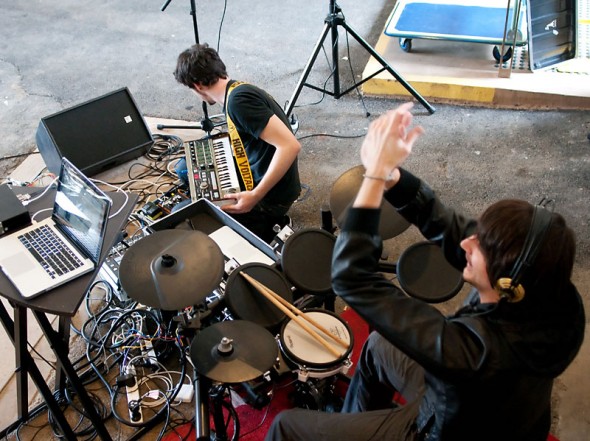
About this time last year I was asked if I wanted to put together a panel for one of the sessions at the 2011 UnConvention conference. The initial idea presented to me was for a panel on music photography, which would have been straightforward; I know the people I would have had on the panel, coming up with topics for discussion would have been easy, and (to some extent) I know what I’m talking about. I would have been on fairly safe ground.
Having agreed to curate a panel, the premise of the discussion mutated from photography to a more wide-ranging title of “Documenting The Scene”, something similar but slightly more tricky. For starters, despite having photos in the Queensland State Library’s collection and having had this blog archived by them for a number of years, I don’t see myself as a “Documenter”. To be honest, I can’t stand the word. I cringe when people use it to describe what they’re doing, especially if related to photographing. To me, “documenting” is far too passive a word. It conjures up a mental image of a scribe being stood on a hill, far away from the action, surveying the landscape before him and describing the battle in the valley below but not actively participating in it. I’m in photography for the aesthetics. My primary focus is to come up with an image (or better still, a set of photos) that I can look at and say “I really like that”. Thoughts of preservation of a moment for future generations doesn’t enter my mind. And of course I’m not in it for the glamour or money.
The other main concern was what would we actually discuss. “Documenting the Scene”? There’s nothing to it really. If you want to do it, go and do it, there’s nothing stopping you. If you want to take photos, get a camera and go and use it. If you want to write about the music scene you can have a blog set up in 5 minutes. You don’t have to, and in fact shouldn’t have to wait for opportunities to come your way, you just do it. You don’t need to be sent CDs for free or assigned to review gigs; if you really want to do it, if you really have to do it, you make it happen for yourself. Ultimately I know that potentially I’m only a couple of changes of editors away from losing the opportunities I have now to photograph at the larger venues and festivals but if that happened I would just go back to photographing smaller local shows in smaller venues like I did when I first moved to Brisbane, the same as I did when I first moved to Sydney, the same as I did when I lived in London. In a way these views got the ball rolling on developing a list of topics for discussion, as I’m interested in people’s mindsets, more the “why?” than the “how?”.
The complete list of topics/questions for discussion I came up with and sent to the panelists was as follows. Feel free to provide answers to any of the questions if you want.
- How did you get started?
- Was documenting a calling or something you fell into? What inspired you to start? Was there a tipping point? Was there anything leading you in this direction even before you made the first steps? Is there a mindset for people documenting music?
- Do you consider yourself a documenter? Why do you do it?
- Any relevant/related qualifications? If so do you recommend studying?
- Different mediums of documenting. What is it about the main medium you choose to work in? Why photography, why zines, why video, why writing?
- Is documenting the local scene important? Will future generations care or want to know?
- How do you choose what you cover?
- Why Brisbane? Have you thought about moving to Sydney/Melbourne and documenting their music scenes? Have you done it anywhere else? How does Brisbane compare?
- Who are your audiences? Do you consider them in what you do? Are you preaching to the converted in a place like Brisbane? There also seems to be a real lack of interest and apathy from the general public about Brisbane�s local music scene. What keeps you going in keeping motivated to document it?
- How do you keep in touch with your audience and build it up? (social media/direct marketing etc)
- Money and Funding. Is there any? Do you do what you do for the money and does it matter?
- None of us are doing this full time (as far as I know…)? How do you find time to do it? Any hints/tips for making time?
- These days everyone is a critic/photographer/videographer. Is this a good or a bad thing?
- The mystique about acts has generally disappeared, especially over the last few years. Has this affected who you approach documenting?
- People seem to think photographing/writing about music is “glamorous”. I’m always being told at festivals by randoms that they’d love to do what I do? Have people got any idea of what it’s really like?
- Are you doing it for the “free stuff”. Is that a good enough reason to do it? Did you start doing it for the “free stuff”.
- What advice would you give to anyone starting out?
- Robert Krulwich On The Future Of Journalism – This is a great read btw
- Everyone wants to get into street press and thinks I can help them do this? How do you get in with street press? Was it worth it? What did you learn for use in your own�endeavours?
- Is ever-changing technology an issue for how you document the scene?
- Do you think you have a limited life-span in being a “documenter”? Can you keep doing what you do and would you want to? Does it become harder the longer you do it and older you get?
- Will video supersede writing and still photography? Given the avenues for hearing and seeing music does anyone need to write about it anymore?
- Only a very few Brisbane bands seem to make music videos. Is this an issue for popularising Brisbane music outside of the city?
- Documenting music in Australian seems to need to be overwhelmingly positive. It’s rare for acts, especially local acts, to get bad reviews/write-ups, at worst the review will be non-committal. Is this an issue for respectability of documenting? How do you address this in the work you do?
- Does street press do enough to cover local music? Do websites like FasterLouder? Does the Courier Mail? Is it me or is the best coverage of local music really in MX? And does anyone care?
- What are the music scenes like in Toowoomba and on the Gold Coast? How do they compare to Brisbane? What are the issues in documenting these scenes?
- Brisbane always feels overlooked despite the healthiness of its music scene. Are there any reasons for this? Is there more that we as documenters could/should do to make more people aware of what’s going on? Does QLD music get a fair deal from the limited amount of national publications, radio and TV?
- Does Brisbane music need the Valley and does the Valley need the scene. What are the alternatives, if any?
- Who’s the next band from SEQ most likely to make it big?
What I Learnt and What I Would Do Differently
Up until 11 June 2011, I’d never been on a stage in front of people with a microphone in my hand leading a 90 minute discussion. Hell, I’d never even been on a panel. Or even talked into a microphone. Nervous didn’t even come close and at the start I could hear my voice wobbling really badly. Having run over my opening words in my head all day I got slightly thrown by having to make a load of announcements at the very start, but managed to forget the most important one of all, that if anyone had a question they should raise their hand at any time and we’d go to them as soon as we could.
I was really happy with the panel and delighted with people that had so willingly given their time; writers, photographers, videographers, zine editors, interviewers, reviewers, every base was covered and most of them with decades of experience to impart. So when I finally remembered to ask for questions it was a bit disheartening that there were none at first. Ultimately I think the list of topics was a lot more to do with the philosophy of “documenting”. Whether or not this was a good thing or not, whether or not the topics took on the subject at far too deep a level, rather than “How do you set up a WordPress site?” or “What camera would you recommend?”, I don’t know. I was happy with the questions and it gave us plenty to try and get through on the panel. In our allotted 90 minutes we barely scratched the surface and only covered about a quarter of the list.
Based on my first-time experience, four things I think you should do if you’re planning a panel:
- No more than five people in total on the panel (I had six). I think there’s a natural tendency to initially think that you won’t have enough to fill your 90 minutes but as soon as you start positioning the chairs on the stage you realise that you’ve got too many people.
- Remember to ask for questions at the start.
- Kelly Lloyd ran the last discussion session of the weekend and I loved how she properly introduced everyone on her panel, spent a couple of minutes talking to them one-on-one and thanked them for being there. It was obvious that she’d done this sort of thing before. If I had to do it again I’d chose to take this approach rather than starting at one end of the panel and letting everyone introduce themselves.
- I was advised to try and have a get together with the people on my panel before the actual day. Although there was a get together the night before in the Valley for all the organisers and panelists, we didn’t meet until about 15 minutes before the start. It would have definitely helped, not just in with everyone being introduced to everyone else but also to help better guide the discussion itself. There was very definite conflict on my panel, and whilst not necessarily a bad thing, if you have some advance warning of others’ views, it might have slightly smoothed over tension a bit.
- When you’re up there you want to give the panelists their opportunity to talk but you also need to weigh this up with keeping the discussion flowing and on topic and making sure that everyone has the opportunity to share their views. It’s hard because you don’t want to interrupt people mid-flow and made all the harder having only just met some of them mere minutes before the start. You don’t want to be rude but you have to be.
Having started off so wobbly, by the end I was completely buzzing, to the point of not wanting to stop and wanting to be on the next panel, whatever it was about, and the one after that and the one after that. It’s strange how in the space of 90 minutes you become comfortable with it, power hungry even: I’m on stage with a microphone so I’m going to tell you what I think. Having previously been asked to be on other panels I’m ruing that I didn’t take up the opportunities. I’ve always loved talking about music, whatever the aspect, whether it be visual, the media aspects, fashion, mythology or even the music itself, even down to the level of the recording processes and gear used (although I’m not as overzealous when it comes to guitars and pedals as I was in my youth). Whether it was any good or not from an audience point of view, being on the “Documenting The Scene” panel was personally one of the best things I’ve done in years. As such, I am now available for all your future music conference panel needs.
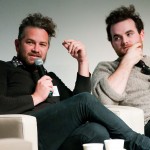
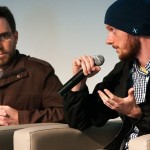
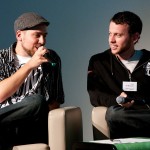
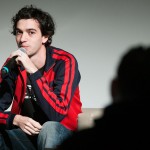
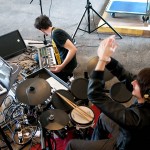
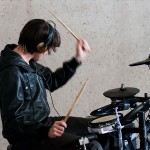

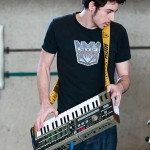
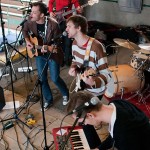
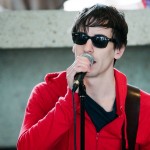
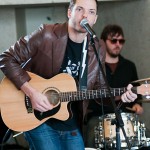

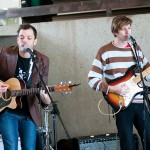
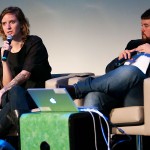
Glad you enjoyed it Justin!
Yeah, it was great. Keen to be involved again if anything is happening this year.